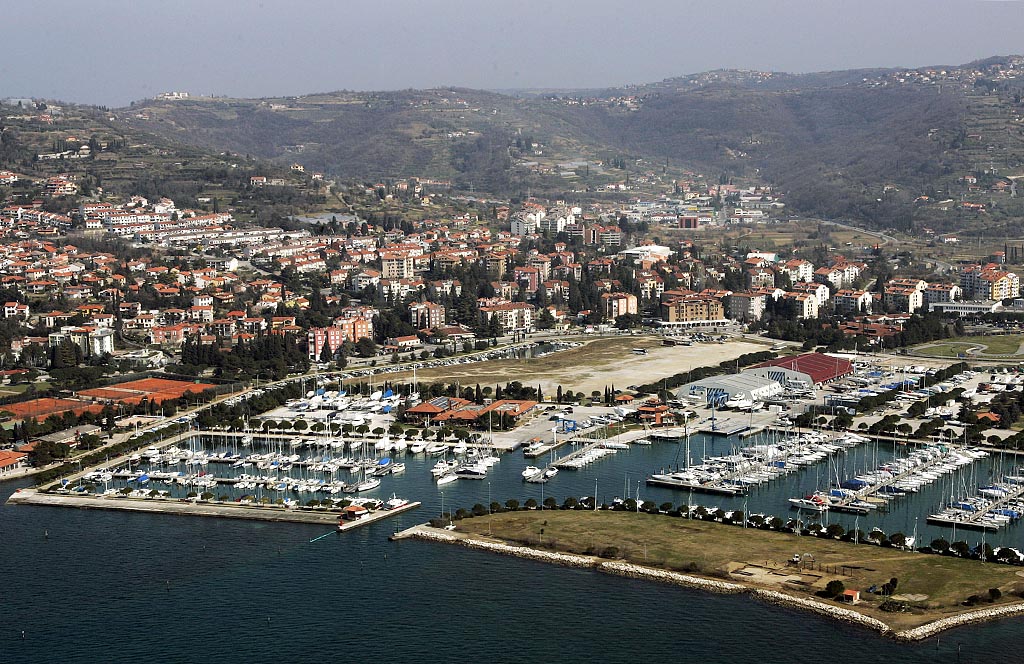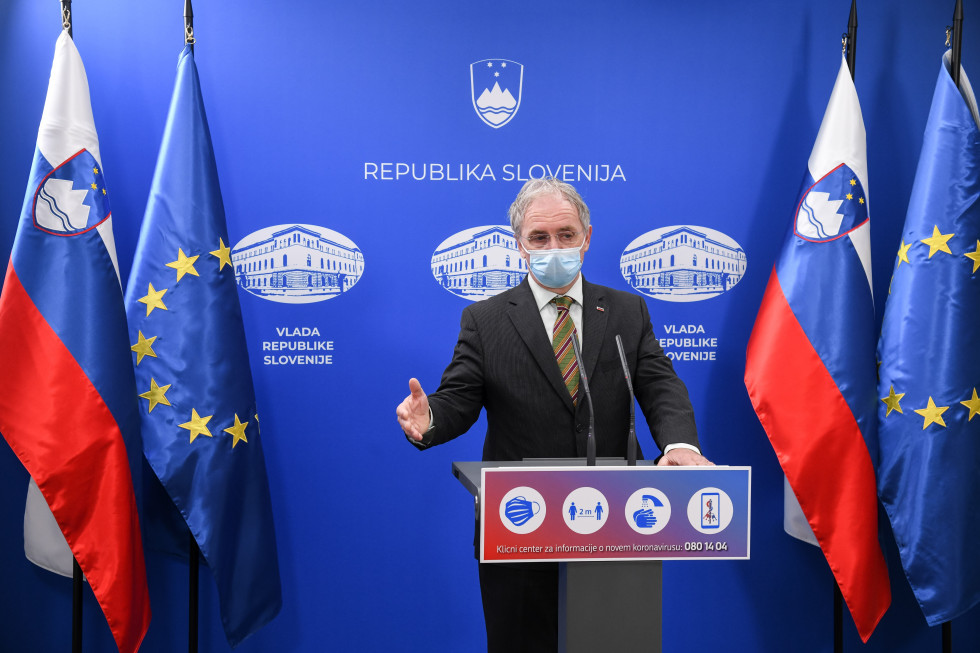By: UKOM
A press conference on the current situation regarding the Covid-19 virus was held by Minister of the Interior Aleš Hojs, Director of the National Institute of Public Health Milan Krek, Head of the Consulate Sector at the Ministry of Foreign Affairs Andrej Šter and Slovene living in Argentina Mariana Poznič.
Official spokesperson Maja Bratuša presented the most recent data on cases of Covid-19 infection. A total of 4,484 PCR tests and 20,446 rapid antigen tests were performed on Thursday. A total of 912 new cases were confirmed through PCR testing, resulting in a positivity rate of 20.3%. The seven-day average of confirmed positives was 764, with yesterday’s level standing at 763.
The number of hospitalised patients is falling, as there are currently 529 patients in hospital with Covid-19, which is 17 fewer than on Thursday. Of those, 95 are in intensive care, which is the lowest number of patients requiring intensive care since 28 October 2020. A total of 42 people were discharged from hospital, while 14 patents died.
Minister of the Interior Aleš Hojs said that the Government adopted a new ordinance at last night’s correspondence session, under which the restriction on movement in the Coastal-Karst region will be reinstated as of Saturday, 27 February 2021. The Government also reiterated the measures already in place. Since the epidemiological situation is fairly comparable among the municipalities in the Coastal-Karst region, and since there is only one region that has re-entered the red phase, the Government decided that movement would be restricted throughout the entire region, and not just in the individual municipalities within that region.
From this Saturday on, public assembly is prohibited in the Coastal-Karst region, and entry into and departure from the Coastal-Karst region is also prohibited. Schools in the region remain open.
The exceptions that already applied to movement between municipalities now apply to movement into and out of the Coastal-Karst region, while the exception allowing access to shops and services in other municipalities if they are closer to the individual’s place of residence than such shops or services in the municipality of residence, or if there are no such shops or services in the municipality of residence, has been revoked.
The ordinance restricting movement in the region also includes exceptions that apply to crossing the national border. It is now possible to travel across the border in the Coastal-Karst region if the person has had a negative PCR or rapid test within the past 48 hours; if they have a medical certificate stating that they have recovered from Covid-19, or if they have proof that they have received two doses of the Pfizer-BioNTech or Moderna vaccines. In the case of the Pfizer-BioNTech vaccine, at least seven days must have passed since receiving the second dose, and 14 days for the Moderna vaccine. If the person was vaccinated with a single dose of the AstraZeneca vaccine, at least 21 days must have passed.
In conclusion, the Minister called on Slovenian citizens not to go to the seaside this weekend, and called on residents of the Coastal-Karst region not to travel to other regions, as this is the only way that we can once again contain the rapid growth of the virus in the Coastal-Karst region, and bring the region back into the orange and eventually the yellow phase.
Director of the National Institute of Public Health Milan Krek noted that the infection rate is unfortunately rising, and that the worst situation is in the Coastal-Karst region, where the seven-day average of confirmed cases per 100,000 inhabitants of Slovenia by statistical region stands at 61.5. Another problem is that the other regions are unfortunately not transitioning from the orange to the yellow phase, and there are currently only two regions in the yellow phase, Southeast Slovenia and the Posavje region. According to Krek, the number of cases is also rising in the other regions.
He emphasised that despite this, Slovenia is not at the top of the world rankings in terms of both the infection rate and the death rate, as there are several European countries showing worse results.
With regard to the mortality trend in Slovenia, Krek said that the peak in mortality among the entire population corresponds with the peak in mortality at nursing homes. After the introduction of vaccinations in nursing homes, the number of deaths dropped sharply. These trends are therefore currently all negative and moving downwards.
Head of the Consulate Sector at the Ministry of Foreign Affairs Andrej Šter repeated the position of the Ministry of Foreign Affairs, which is advising against all non-essential travel abroad. He stated that whether travel is considered essential depends on the primary reason for travel and whether it is in Slovenia’s vital interest. He mentioned the unnecessary creation of an excessively negative image of Slovenia regarding the high number of Covid-19 infections and the consequent high number of deaths due to the novel coronavirus, which could make it even more difficult for Slovenian citizens to travel to foreign countries, which are already placing strict limits on non-essential travel to their countries and adopting additional restrictions.
Mariana Poznič, a Slovene who lives in Argentina, spoke about her experiences with preventive measures during the epidemic in Argentina. She concluded her presentation with the statement that at this time the future is a major unknown. The virus could be with us for a long time to come, so we will have to adjust to this new normal. We all miss family and social gatherings, breathing fresh air without obstruction, nearness and hugs. We know that there are differences between the rich and the poor and that they will remain, both among countries and among people, but this virus is teaching us that we can’t do everything ourselves, we need to work together and maintain a high level of solidarity.
Source: gov.si


